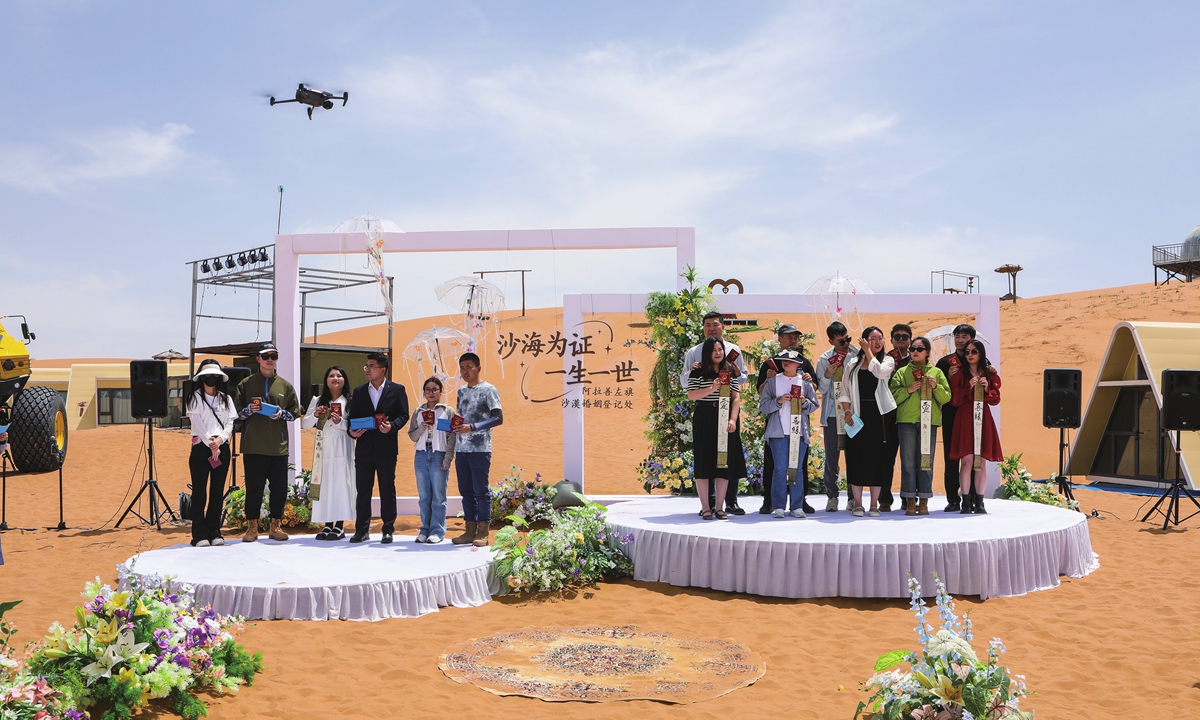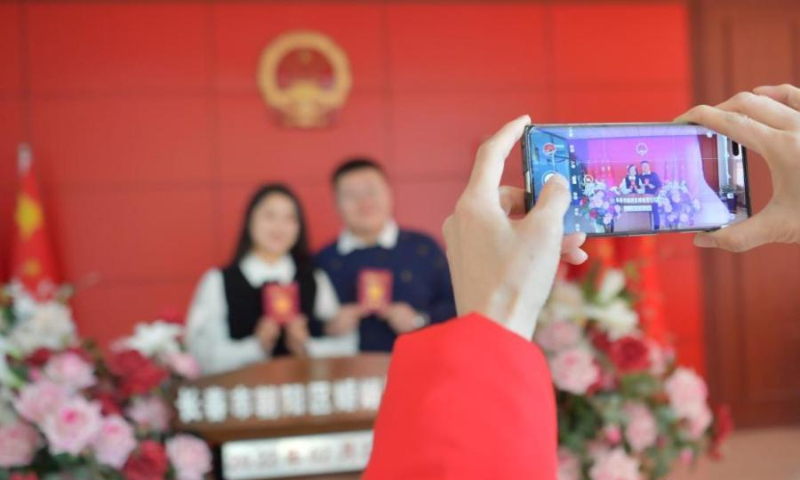Young Chinese couples embrace marriage registration at scenic destinations across the country
Love without boundaries

Several couples take a group picture after completing their marriage registration at the Tengger Desert in North China's Inner Mongolia Autonomous Region on May 20, 2025. Photo: Courtesy of Liu Chunmei
How many people, while reading Chinese writer Sanmao's Stories of the Sahara and coming across the part where she and José registered their marriage in the Sahara Desert with the blessings of the local residents, have imagined the excitement of becoming a lawful partner to their loved one in a similar romantic setting? Now, what was once just imagination can become reality.Tuesday, May 20, was a special day for Zhang Shangjie and his fiancée: the couple decided to officially tie the knot. To make the marriage registration process more ceremonial and romantic, the couple made a reservation at the newly opened marriage registration office located in the Tengger Desert in Alxa Left Banner, North China's Inner Mongolia Autonomous Region. There, under the vast expanse of golden sands and blue skies, they exchanged vows to spend the rest of their lives together.
Thanks to the implementation of a new nationwide marriage registration policy that allows couples to register their marriage anywhere in the country, regardless of their hukou registration location, more young couples across China, including Zhang, have chosen to make the marriage registration process more romantic and memorable. Many opt to do so surrounded by stunning scenery - be it in the mountains, in a desert, on a beach, or nearby a lake - creating their own unique memories to mark this special day.
"The memory of this experience will remind us again and again that our love can transcend even the vastness of the desert. In the future, she and I will continue to explore the myriad of beautiful landscapes the world has to offer. Every desert we visit will bring the joy and excitement we felt when we registered our marriage back to us. From now on, no matter where the deserts are, they will no longer be just natural wonders to us - they will stand as enduring symbols of our love and devotion," Zhang told the Global Times.
Built for romance
May 20 and May 21 are especially popular dates for couples to tie the knot, as the numbers "520" and "521" both sound similar to "I love you" in Chinese. On this May 20, the civil affairs bureau of Alxa Left Banner opened a marriage registration branch office in the Tengger Desert.
Zhang first heard the news on social media a few days earlier, and several friends also recommended the unique experience. Inspired, he drove for hours with his fiancée to the desert on the opening day to receive their marriage certificate.
After arriving at the registration site, Zhang discovered that, in addition to their couple, seven other pairs also held their wedding registration ceremonies that day. The authority and the scenic area prepared traditional Mongolian song and dance performances for them. The representatives of the newlyweds also took the stage to speak, advocating for "zero bride price and simple weddings," actively promoting new wedding customs through practical actions.
Liu Chunmei, who oversees the desert camp where the marriage registry office is situated, told the Global Times that the registration site is located at an altitude of approximately 1,314 meters. Interestingly, this number sounds similar to "All lifelong" in Chinese, symbolizing a positive blessing for young couples.
Cao Jing, deputy director of the civil affairs bureau of Alxa Left Banner, explained that the establishment of the desert marriage registration office is an innovative practice that breaks geographical boundaries in civil affairs services and embodies the concept of love transcending mountains and seas.
"Relying on the nationwide policy of marriage registration accessibility, we welcome couples from across the country to come here and pledge their lifelong commitment. We will continue to enhance our services and turn this place into a landmark for witnessing love, allowing more people to create unique and unforgettable memories of happiness," said Cao on the opening day.
After completing the registration, young couples can stay at the desert camp to enjoy the scenery and participate in various activities, according to Liu. Such combination of marriage registration with cultural experiences has been emerging across the country. One instance of this trend can be found in the Sayram Lake scenic area in Northwest China's Xinjiang Uygur Autonomous Region.

A newly wedded couple poses for a picture at a marriage registration office in Wuhan, Central China's Hubei Province, on May 20, 2025. Photo: VCG
New opportunitiesIn videos shared on social media, a long queue of newlyweds could be seen outside the marriage registration office at Sayram Lake on Tuesday morning. Due to the cold weather, many people had to wrap themselves in quilts to keep warm, all just to be able to register their marriage as early as possible.
Initiatives such as a lifetime discount for couples who completed their marriage registration in the scenic area further enhanced its appeal as a cultural and tourism destination, according to the local civil affairs bureau.
Chun'an in East China's Zhejiang Province also introduced a marriage and tourism service that combines the local 5A scenic area marriage registration center with multiple outdoor venues.
To attract more couples, Chun'an has also launched a series of incentivizing policies: couples who register in Chun'an can enjoy free admission to key scenic spots such as the Qiandao Lake, Tianyu, and Longchuan Bay for an entire year. Additionally, couples who register on or after May 10 will receive discounts at 17 dining and accommodation establishments.
Zhong Lina, director of the China tourism big data center at Beijing International Studies University, noted that the combination of marriage registrations with tourism is a chance for local tourism development. To capitalize on the trend of tourism-based marriage registration, it is essential to go beyond creating physical spaces and attractions. "It's important to distill unique cultural symbols and create a distinct local brand," Zhong told cnr.cn.


